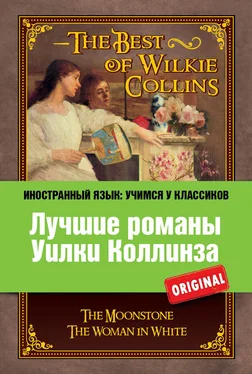Greatly to my relief, Sir Percival sent an apology for not joining us at breakfast. He had taken an early cup of coffee in his own room, and he was still engaged there in writing letters. At eleven o’clock, if that hour was convenient, he would do himself the honour of waiting on Miss Fairlie and Miss Halcombe.
My eyes were on Laura’s face while the message was being delivered. I had found her unaccountably quiet and composed on going into her room in the morning, and so she remained all through breakfast. Even when we were sitting together on the sofa in her room, waiting for Sir Percival, she still preserved her self-control.
“Don’t be afraid of me, Marian,” was all she said; “I may forget myself with an old friend like Mr. Gilmore, or with a dear sister like you, but I will not forget myself with Sir Percival Glyde.”
I looked at her, and listened to her in silent surprise. Through all the years of our close intimacy this passive force in her character had been hidden from me – hidden even from herself, till love found it, and suffering called it forth.
As the clock on the mantelpiece struck eleven Sir Percival knocked at the door and came in. There was suppressed anxiety and agitation in every line of his face. The dry, sharp cough, which teases him at most times, seemed to be troubling him more incessantly than ever. He sat down opposite to us at the table, and Laura remained by me. I looked attentively at them both, and he was the palest of the two.
He said a few unimportant words, with a visible effort to preserve his customary ease of manner. But his voice was not to be steadied, and the restless uneasiness in his eyes was not to be concealed. He must have felt this himself, for he stopped in the middle of a sentence, and gave up even the attempt to hide his embarrassment any longer.
There was just one moment of dead silence before Laura addressed him.
“I wish to speak to you, Sir Percival,” she said, “on a subject that is very important to us both. My sister is here, because her presence helps me and gives me confidence. She has not suggested one word of what I am going to say – I speak from my own thoughts, not from hers. I am sure you will be kind enough to understand that before I go any farther?”
Sir Percival bowed. She had proceeded thus far, with perfect outward tranquillity and perfect propriety of manner. She looked at him, and he looked at her. They seemed, at the outset, at least, resolved to understand one another plainly.
“I have heard from Marian,” she went on, “that I have only to claim my release from our engagement to obtain that release from you. It was forbearing and generous on your part, Sir Percival, to send me such a message. It is only doing you justice to say that I am grateful for the offer, and I hope and believe that it is only doing myself justice to tell you that I decline to accept it.”
His attentive face relaxed a little. But I saw one of his feet, softly, quietly, incessantly beating on the carpet under the table, and I felt that he was secretly as anxious as ever.
“I have not forgotten,” she said, “that you asked my father’s permission before you honoured me with a proposal of marriage. Perhaps you have not forgotten either what I said when I consented to our engagement? I ventured to tell you that my father’s influence and advice had mainly decided me to give you my promise. I was guided by my father, because I had always found him the truest of all advisers, the best and fondest of all protectors and friends. I have lost him now – I have only his memory to love, but my faith in that dear dead friend has never been shaken. I believe at this moment, as truly as I ever believed, that he knew what was best, and that his hopes and wishes ought to be my hopes and wishes too.”
Her voice trembled for the first time. Her restless fingers stole their way into my lap, and held fast by one of my hands. There was another moment of silence, and then Sir Percival spoke.
“May I ask,” he said, “if I have ever proved myself unworthy of the trust which it has been hitherto my greatest honour and greatest happiness to possess?”
“I have found nothing in your conduct to blame,” she answered. “You have always treated me with the same delicacy and the same forbearance. You have deserved my trust, and, what is of far more importance in my estimation, you have deserved my father’s trust, out of which mine grew. You have given me no excuse, even if I had wanted to find one, for asking to be released from my pledge. What I have said so far has been spoken with the wish to acknowledge my whole obligation to you. My regard for that obligation, my regard for my father’s memory, and my regard for my own promise, all forbid me to set the example, on my side, of withdrawing from our present position. The breaking of our engagement must be entirely your wish and your act, Sir Percival – not mine.”
The uneasy beating of his foot suddenly stopped, and he leaned forward eagerly across the table.
“My act?” he said. “What reason can there be on my side for withdrawing?”
I heard her breath quickening – I felt her hand growing cold. In spite of what she had said to me when we were alone, I began to be afraid of her. I was wrong.
“A reason that it is very hard to tell you,” she answered. “There is a change in me, Sir Percival – a change which is serious enough to justify you, to yourself and to me, in breaking off our engagement.”
His face turned so pale again that even his lips lost their colour. He raised the arm which lay on the table, turned a little away in his chair, and supported his head on his hand, so that his profile only was presented to us.
“What change?” he asked. The tone in which he put the question jarred on me – there was something painfully suppressed in it.
She sighed heavily, and leaned towards me a little, so as to rest her shoulder against mine. I felt her trembling, and tried to spare her by speaking myself. She stopped me by a warning pressure of her hand, and then addressed Sir Percival one more, but this time without looking at him.
“I have heard,” she said, “and I believe it, that the fondest and truest of all affections is the affection which a woman ought to bear to her husband. When our engagement began that affection was mine to give, if I could, and yours to win, if you could. Will you pardon me, and spare me, Sir Percival, if I acknowledge that it is not so any longer?”
A few tears gathered in her eyes, and dropped over her cheeks slowly as she paused and waited for his answer. He did not utter a word. At the beginning of her reply he had moved the hand on which his head rested, so that it hid his face. I saw nothing but the upper part of his figure at the table. Not a muscle of him moved. The fingers of the hand which supported his head were dented deep in his hair. They might have expressed hidden anger or hidden grief – it was hard to say which – there was no significant trembling in them. There was nothing, absolutely nothing, to tell the secret of his thoughts at that moment – the moment which was the crisis of his life and the crisis of hers.
I was determined to make him declare himself, for Laura’s sake.
“Sir Percival!” I interposed sharply, “have you nothing to say when my sister has said so much? More, in my opinion,” I added, my unlucky temper getting the better of me, “than any man alive, in your position, has a right to hear from her.”
That last rash sentence opened a way for him by which to escape me if he chose, and he instantly took advantage of it.
“Pardon me, Miss Halcombe,” he said, still keeping his hand over his face, “pardon me if I remind you that I have claimed no such right.”
The few plain words which would have brought him back to the point from which he had wandered were just on my lips, when Laura checked me by speaking again.
Читать дальше
Конец ознакомительного отрывка
Купить книгу












